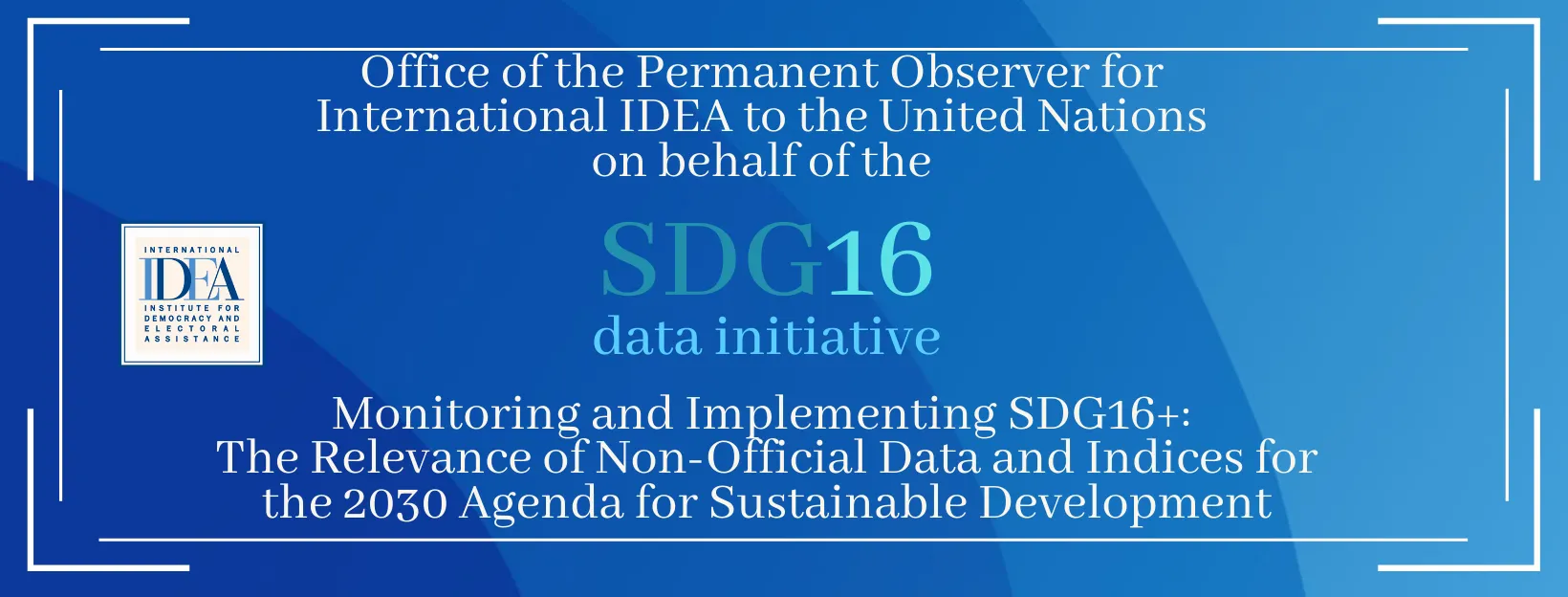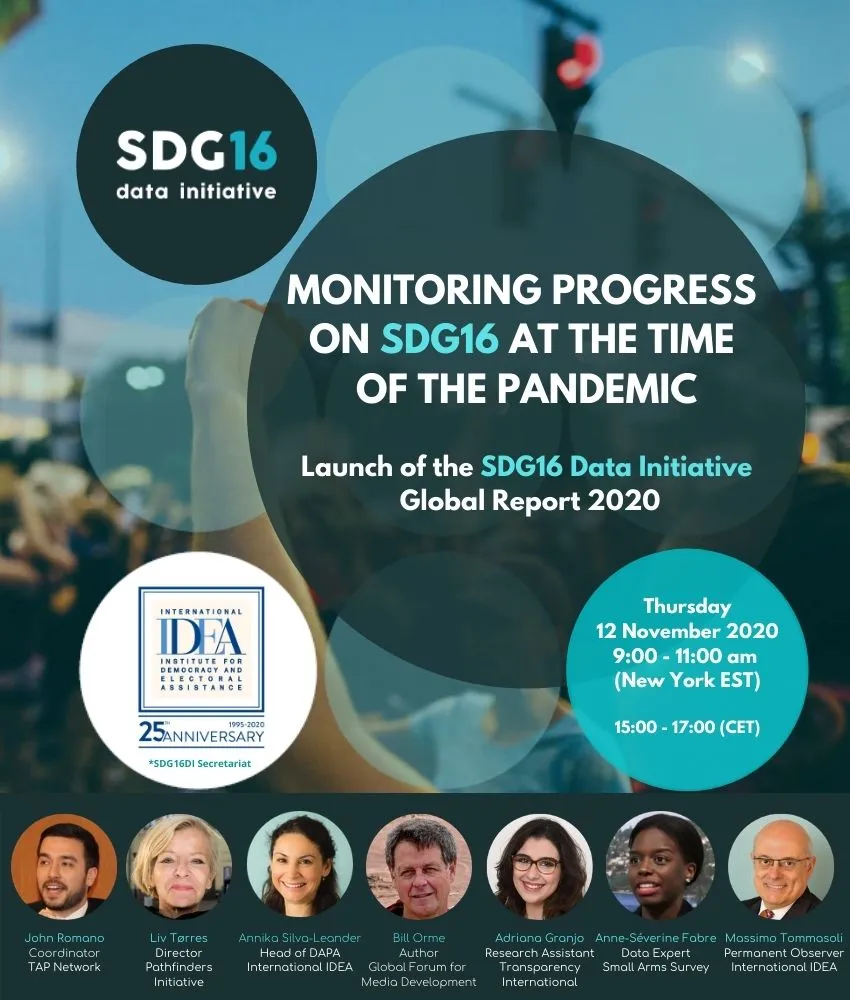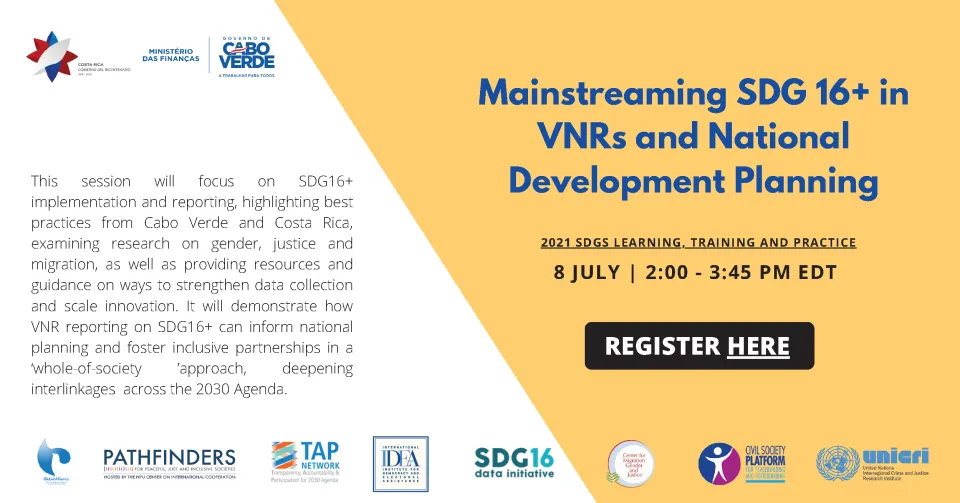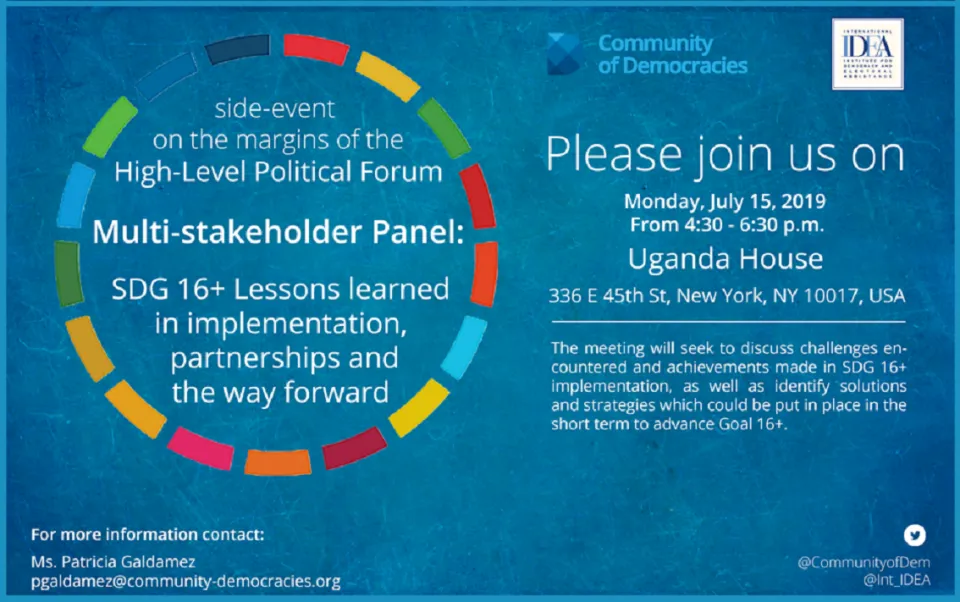Monitoring and Implementing SDG16+: The Relevance of Non-Official Data and Indices for the 2030 Agenda for Sustainable Development

Background: The SDG16 Data Initiative (DI) was launched in July 2016 by a consortium of partner organizations that seeks to support the open and holistic tracking of the commitments made by all 193 UN Member States captured in SDG16+. The SDG16 DI was created to respond to the gap in terms of comprehensive data on SDG16 issues, especially civil society generated data, open global monitoring and improved availability of data for civil society actors. The partnership created and maintains an interactive website.
Thematic focus
The SDG16 is about the importance of a governance-informed development. However, it is particularly challenging for open data collection. Some official indicators still lack an agreed methodology (Tier 3 indicators). Other politically sensitive data are not included in the agreed set of official indicators, although they would better describe trends and achievements in implementation.
Non-official data, as highlighted by the SDG16 DI, independently address gaps in data availability, through innovative methodologies and can reduce capacity strain on NGOs through strategic partnerships. Critically, non-official data can provide accountability to governments, ensuring perceptions and needs of marginalized groups are accounted for.
This session will advance monitoring and implementing SDG16+ with new data and guidance for policy makers and civil society. The side event will analyze the main outcomes of the SDG16 DI. First, the session will provide an overview of the type of data collected and shared through the interactive website SDG16.org, which allows users to compare progress across time and context, understand the strengths and weaknesses of different indicators and data sets, and identify gaps in data availability.
Second, the panel will present the experience of the SDG16 DI in monitoring progress on the implementation of the 2030 Agenda on the basis of the Annual Global Reports produced by the partnership in 2017-19. Since it assesses global progress towards realizing the 2030 Agenda’s commitment to peaceful, just and inclusive societies, the Annual Global Report is an opportunity to benchmark progress over the past year and explore key trends in-depth.
Third, the panel will provide an opportunity to share tools and knowledge products developed and tested by members of the SDG16 DI partnership for analyzing trends in the implementation of the 2030 Agenda, at both country (Voluntary National Reviews) and global levels.
Issues for discussion
- The importance of perception and experience-based indicators in a people-centered agenda, to mainstream gender and diversity and leave no one behind, on the basis of some results of the SDG16 DI 2019 Annual Report, with examples on selected targets.
- The value of a partnerships which combines expertise and experiences of the different communities of practice that work on SDG16 (peace, justice and accountable institutions) in order to contribute to complementing official indicators with non-official data, so as to capture important and often neglected dimensions of SDG16+ targets.
- The need to invest in country-level data on the basis of an understanding of the particular ecosystem of official and non-official indicators on SDG16+.
- The need to build partnerships and engage both data producers and data users in this conversation. How to build trust in data, how to facilitate data literacy among citizens.
Possible recommendations for action
- Non-official data sources should be included alongside official data sources in the global, regional and national monitoring of SDG16 implementation.
- Expanding the members of civil society—especially those representing local and marginalized voices—who understand and engage with SDG16+ and its targets, indicators and data.
- Official indicators should both retain Tier III indicators, that have not yet an agreed methodology, and add additional indicators that meet quality standards and more accurately reflect the objectives of the targets.
- Member States, National Statistical Offices and UN custodian agencies should accept the role of civil society non-official innovative methodologies, data and resources, which should be integrated into monitoring processes. Custodian agencies for different indicators should be required to come up with clear methodologies for assessing whether States have achieved those indicators.
- Partnerships involving public sector and civil society data providers should be established to increase mutual trust and improve the knowledge for evidence-based public deliberation and policies.
The partnership currently includes the Global Financial Integrity, Global Forum for Media Development, Governance Data Alliance, Hague Institute for the Innovation of Law, Institute for Economics and Peace, International IDEA, Namati, Open Society Foundations, Peace Research Institute Oslo, Results for Development, Saferworld, Small Arms Survey, Sustainable Development Solutions Network, TAP Network, Transparency International, the World Justice Project and the World Values Survey Association.
List of Speakers
Dr Sarah Lister, Head of Governance, Bureau for Program and Policy Support, UNDP
Ms Malene Almeida, Co-ordinator of the Praia City Group Secretariat
Mr Tom Cardamone, President and CEO, Global Financial Integrity
Dr Martin Brusis, Senior Programme Officer, International IDEA
Mr Håvard Strand, Senior Researcher, PRIO
Mr Emile LeBrun, Project Coordinator, Small Arms Survey
Dr Kevin Casas-Zamora, Secretary-General of International IDEA (TBC)
Mr Bill Orme, on behalf of the Global Forum for Media Development (GFMD)
Dr Massimo Tommasoli, Permanent Observer for International IDEA to the United Nations
To RSVP, please visit: https://www.eventbrite.com/e/monitoring-and-implementing-sdg16-registration-95285215645.



